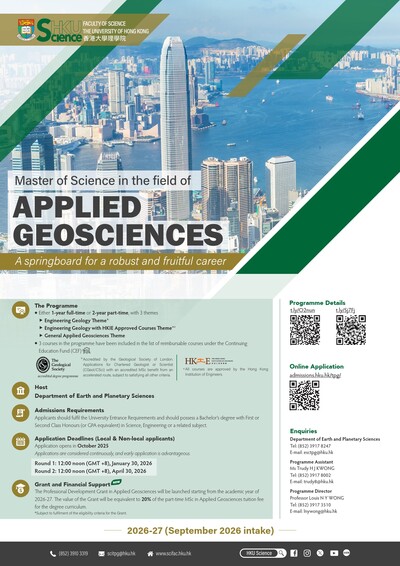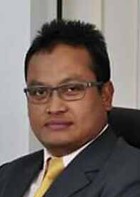 | |
Engineering Geology Theme
This theme aims at helping engineering geologists improve their performance in professional work. Engineers and scientists wanting to advance their understanding of geology and geotechnics are also invited to apply for admission. The theme concentrates on the application of geology and mechanics in geotechnical practice and the development of professional skills.
Engineering Geology with HKIE Approved Courses Theme
All courses are approved by the Hong Kong Institution of Engineers.
General Applied Geosciences Theme
For full-time students (non-geologists)
This theme aims to help science graduates, including geospatial professionals, advance their understanding of geology and geotechnics.
Admission Requirements
Applicants should fulfil the University Entrance Requirements and possess a Bachelor’s degree with First or Second Class Honours (or GPA equivalent) in Science, Engineering or a related subject.
For 2026-27 intake:
Application opens in 3 October 2025
Applications are considered continuously, and early application is advantageous.
Application Deadlines (Local and Non-local students):
Round 1 deadline: 12:00 noon (GMT +8), January 30, 2026
Round 2 deadline: 12:00 noon (GMT +8),
- Non-local applicants (30 April, 2026)
- Local applicants (30 April, 2026)
Applications can be submitted via our on-line application system here.
Expected degree conferment will take place in:
Full-time: November / December 2027 (Winter Congregation)
Part-time: November / December 2028 (Winter Congregation)
► Articulation Pathways to HKU Science Full-time Taught Postgraduate Programmes
Fees for 2026-27 intake:
The annual composition fee for the academic year 2026-2027 is HK$200,000#. Part-time students will pay HK$100,000# per year for two years. Payment can be paid in two instalments each year.
In addition, students are required to pay Caution Money (HK$350, refundable on graduation subject to no claims being made) and Graduation Fee (HK$350). With effect from 2022-23, all full-time students will be charged a student activity fee of HK$100 per annum to provide support for activities of student societies and campus wide student events.
#Subject to approval
*NEW grant opportunity is available for part-time students. For more details, please refer to the Scholarships and Financial Support section
Scholarships and Financial Support
- Persons of the Muslim faith born in Hong Kong or Penang are eligible to apply for Taufik Ali Memorial Scholarships
- The scholarship may cover tuition fees, on a case-by-case basis. For details: https://scholar.aas.hku.hk/?action=showonesscheme&ss_id=255
- Association of Geotechnical and Geoenvironmental Specialists (Hong Kong) Scholarship
This $10,000 scholarship is awarded annually on the basis of academic achievement.
- Government's Non-means Tested Loan Scheme
For more information, please visit here
- Prizes
Halcrow Prizes are awarded to the Best Student and the Best Dissertation.
- Professional Development Grant in Applied Geosciences
The value of the Grant shall be equivalent to 20% of the part-time MSc in Applied Geosciences tuition fee for the degree curriculum. For details: https://www.earthsciences.hku.hk/education/postgraduate_students/taught_postgraduates_(MSc(AG))/
Courses Reimbursable by the Continuing Education Fund (CEF)
Courses in the programme:
- GEOS7012 Site Investigation and engineering geological techniques
- GEOS8101 Engineering geology and geotechnical design
- GEOS8102 Rock engineering and geomaterials
are reimbursable courses for the purposes of CEF. All CEF applicants are required to attend at least 70% of the classes of each course before they are eligible for fee reimbursement under the CEF.
The mother programme (Master of Science in the field of Applied Geosciences) of these courses is recognised under the Qualification Framework (QF Level 6)

The Engineering Geology Theme and the Engineering Geology with HKIE Approved Courses Theme of the MSc in Applied Geosciences are accredited by the Geological Society of London, the body which awards the qualification Chartered Geologist. Applicants with an accredited MSc need fewer years of working experience to apply for Chartered Geologist.

Fourteen courses of the MSc in Applied Geosciences are approved by the Hong Kong Institution of Engineers.
What will this MSc give you?
- The chance to learn from top professors and leading practitioners from industry
- Technical knowledge and professional skills you can apply anywhere
- A valuable network of industry connections, career advice and inspiration
Programme Structure
To be eligible for the award of the MSc in the field of Applied Geosciences, a student shall complete all core courses and total credits prescribed in a selected theme and elective courses, if any, totalling 66 or 69 credits.
ENGINEERING GEOLOGY THEME (66 credits)
| Core Courses | |
|---|---|
OR | ^ Geology principles and practice (6 credits) OR * Advanced geology of Hong Kong (6 credits) |
| ^Geology of Hong Kong (6 credits) | |
| GEOS7012 | Site investigation and engineering geological techniques (6 credits) |
| GEOS7015 | Rock mechanics (3 credits) |
| GEOS7016 | Soil mechanics (3 credits) |
| GEOS7020 | Project part I (6 credits) |
| ^ Geological fieldwork I (3 credits) OR * Geological fieldwork II (3 credits) | |
| GEOS8001 | Hydrogeology (3 credits) |
| GEOS8002 | Professional practice in applied geosciences (3 credits) |
| GEOS8003 | Seminars on unforeseen ground conditions, geotechnical and environmental failures (3 credits) |
| GEOS8020 | Project part II (12 credits) |
| GEOS8101 | Engineering geology and geotechnical design (6 credits) |
| GEOS8102 | Rock engineering and applications (6 credits) |
| GEOS8104 | * Natural hillside landslide and hazard studies (3 credits) |
| GEOS8204 | * Basic structural mechanics and behaviour (3 credits) |
Other courses | #Course of directed studies (3 credits) |
| GEOS7035 | #Intermediate geology (6 credits) |
| GEOS7036 | #Innovative technology and environmental sustainability (3 credits) |
^ For students whose first degree is not in Geology or a related subject * For students with a first degree in Geology or a related subject # As directed by the programme director | |
Core courses for students with a first degree in Geology or a related subject: GEOS7011, 7012, 7015, 7016, 7020, 8001, 8002, 8003, 8020, 8021, 8101, 8102, 8104, 8204 – 66 credits. Course GEOS7022 may be substituted for course GEOS8204 if directed by the Programme Director. | |
Core courses for students whose first degree is not in Geology or a related subject: GEOS7010, 7012, 7015, 7016, 7020, 7021, 7033, 8001, 8002, 8003, 8020, 8101, 8102 – 66 credits. | |
ENGINEERING GEOLOGY WITH HKIE APPROVED COURSES THEME (69 credits)
| Core Courses | |
|---|---|
| GEOS7012 | Site investigation and engineering geological techniques (6 credits) |
| Rock mechanics (3 credits) | |
| GEOS7016 | Soil mechanics (3 credits) |
| GEOS7020 | Project part I (6 credits) |
| GEOS7024 | Management (3 credits) |
| GEOS8001 | Hydrogeology (3 credits) |
| Professional practice in applied geosciences (3 credits) | |
| GEOS8003 | Seminars on unforeseen ground conditions, geotechnical and environmental failures (3 credits) |
| GEOS8020 | Project Part II (12 credits) |
| GEOS8101 | Engineering geology and geotechnical design (6 credits) |
| GEOS8102 | Rock engineering and applications (6 credits) |
| GEOS8204 | Basic structural mechanics and behaviour (3 credits) |
| GEOS8205 | Mathematics I (6 credits) |
| GEOS8206 | Mathematics II (6 credits) |
Other courses | #Innovative technology and environmental sustainability (3 credits) |
# As directed by the programme director
GENERAL APPLIED GEOSCIENCES THEME (66 credits)
(For full-time students (non-geologists)
| Core Courses | |
|---|---|
| GEOS7010 | Geology principles and practice (6 credits) |
| GEOS7033 | Geology of Hong Kong (6 credits) |
| GEOS7015 | Rock mechanics (3 credits) |
| GEOS7016 | Soil mechanics (3 credits) |
| GEOS7020 | Project part I (6 credits) |
| GEOS7021 | Geological fieldwork I (3 credits) |
| GEOS7024 | Management (3 credits) |
| GEOS7035 | Intermediate geology (6 credits) |
| GEOS7036 | Innovative technology and environmental sustainability (3 credits) |
| GEOS8001 | Hydrogeology (3 credits) |
| Professional practice in applied geosciences (3 credits) | |
| GEOS8003 | Seminars on unforeseen ground conditions, geotechnical and environmental failures (3 credits) |
| GEOS8020 | Project part II (12 credits) |
| GEOS8209 | Climate change and society (6 credits) |
Teaching will take place mainly on weekday evenings but students are expected to undertake field and laboratory work during weekends. For part-time students normally there are two evening classes each week but in some semesters there are three. Full-time students attend the same evening classes as part-time students, most of whom have day-time employment. Concentrated teaching may be held at weekends.
Course contents
| Courses | ||
|---|---|---|
GEOS7010 Geology principles and practice (6 credits)This course provides a comprehensive review of fundamental concepts in geosicence, including earth and geological processes, surface processes, minerals and rocks, geological structures, and geological map interpretation. It aims to enhance students' practical skills in identifying minerals and rocks, which will be developed through dedicated practical sessions aimed at refining their analytical and observational abilities. Assessment: GEOS7011 Advanced geology of Hong Kong (6 credits)This advanced course explores the specialised aspects of the rocks and geological formations and structures in Hong Kong and their importance in geotechnical engineering, natural hazard management and resource development. Topics include volcanic systems, volcanic-plutonic connections, marble formations and complex geology, metamorphic rocks, tectonic history and geological structures, Quaternary stratigraphy and processes, and geological aspects of landslides.
GEOS7012 Site investigation and engineering geological techniques (6 credits)A professional course on the concepts and skills used in geotechnical site investigation. Topics include the design of site investigations, desk study and walkover survey, aerial photographic interpretation, soil and rock description and classification, ground investigation technology and soil and rock laboratory testing. Assessment: GEOS7015 Rock mechanics (3 credits)The course introduces the basic concepts of rock mechanics used in geotechnical practice. Topics include index properties, strength and deformability of intact rock; distribution and measurement of in-situ stresses; and shear strength of discontinuities in rock masses. Assessment: GEOS7016 Soil mechanics (3 credits)An examination of the basic soil mechanics theory used in geotechnical practice. The course reviews phase relationships, elasticity and plasticity, soil classification, compaction, seepage and effective stress concepts; and provides a more detailed analysis of lateral earth pressures, shear strength and consolidation. Assessment: GEOS7020 Project part I (6 credits)The first phase of an independent study of a problem in applied geosciences. It involves literature review, data collection and data analysis. Students are required to write an inception report and give a presentation on their proposed study. Professional geologists are expected to undertake a field mapping task as part of their project. This course provides a capstone experience. Assessment: GEOS7021 Geological fieldwork I (3 credits)Self-directed study in the field over a 6-month period leading to the production of maps, field sheets, narrative accounts and other geological records for assessment. The fieldwork may be undertaken in association with the excursions of the Department of Earth and Planetary Sciences, the local learned societies or independently. (Marked on a pass/fail basis.) Assessment: GEOS7022 Course of directed studies (3 credits)Studies to assist learning in the core courses, involving some of the following activities: professional activities, Assessment:
GEOS7024 Management (3 credits)This course introduces the basic knowledge of project management practice. It will cover the following topics: engineering processes, programming and procurement strategies; contract management; construction site safety, health and environmental aspects; quality control and quality assurance. Assessment: Course work (30%) and written examination (70%) GEOS7033 Geology of Hong Kong (6 credits)To provide an understanding of the principal components of the geology of Hong Kong and its regional setting, including the distribution and interpretation of the main rock types, age relationships; and superficial deposits; and the locations and orientations of the main regional and local structures. Pre-requisite course: Pass in GEOS7010 GEOS7035 Intermediate geology (6 credits)It introduces mineralogy, petrology, structural geology, and further geological topics for non-geologists. Pre-requisite course: Pass in GEOS7010 GEOS7036 Innovative technology and environmental sustainability (3 credits)The course introduces the government policy on the adoption of digital technology and sustainability assessment in public works projects, and provides an understanding of the role of innovative technology and environmental sustainability in engineering practice through case histories and examples.
GEOS8001 Hydrogeology (3 credits)To study the role of sub-surface water in engineering and environmental applications. Topics include the hydrologic cycle, properties of aquifers controlling the transmissivity storage and quality of groundwater, quantification of groundwater flow, the field investigation of groundwater and assessment of field parameters and applications of hydrogeology in engineering and environmental studies. Assessment: GEOS8002 Professional practice in applied geosciences (3 credits)An examination of issues in professional practice in applied geoscience, including regulation of practice, professional ethics and law, contracts and risk management. Assessment: GEOS8003 Seminars on unforeseen ground conditions, geotechnical and environmental failures (3 credits)A series of student-led seminars on case histories of landslides, collapses of engineering structures, excessive ground settlement and environmental disasters. Presentations of facts and opinions are given by students based on Pre-requisite course: Pass in GEOS8002 GEOS8020 Project part II (12 credits)The second phase of an independent study of a problem in applied geosciences culminating in the preparation of a project report of about 10,000 words. Students will be required to make a presentation of their preliminary results. This course provides a capstone experience. Assessment: GEOS8021 Geological fieldwork II (3 credits)Self-directed study in the field over a 6-month period leading to the production of maps, field sheets, narrative accounts and other geological records for assessment. The fieldwork may be undertaken in association with the excursions of the Department of Earth and Planetary Sciences, the local learned societies or independently. (Marked on pass/fail basis.) Assessment: GEOS8101 Engineering geology and geotechnical design (6 credits)An examination of civil engineering design methodology and the application of soil mechanics theory and empiricism in geotechnical design. Emphasis is given to soil slopes and embankments, earth pressure and retaining structures and shallow and deep foundations. Pre-requisite course: Pass in or concurrently enrolled in GEOS7016 GEOS8102 Rock engineering and applications (6 credits)This course starts with a brief introduction to the design methodology and the systems approach in rock Pre-requisite course: Pass in GEOS7015 GEOS8104 Natural hillside landslide and hazard studies (3 credits)The contents of this course will include most of the following topics: classification of landslides; Hong Kong terminology, examples of natural terrain landslides and documentary sources of information; hillslope evolution, geomorphological principles (including the evolutionary landform models of Dalrymple and Hansen) and Quaternary geology of Hong Kong; hillslope hydrology, modes of groundwater flow, runoff and infiltration, piping; hydrological and morphological conditions for initiation of shallow landslides in regolith; engineering geological and geomorphological mapping; landform processes; regolith mapping, boulder identification; landslide hazard assessment; landslide susceptibility assessment for risk quantification; design event approach; landslide mobility modelling. Assessment: GEOS8204 Basic structural mechanics and behaviour (3 credits)The subject will cover most of the following: Assessment: | ||
GEOS8205 Mathematics I (6 credits)This course (together with GEOS8206 Mathematics II) strives to provide a comprehensive introduction to the fundamental mathematics that all earth scientists need. Topics include the language of sets, the concept of matrices and its applications, functions, limits, first order differentiation, applications of derivatives, first order Taylor’s expansion, properties of exponential and logarithmic functions, the notation of integration, integration techniques, volume of revolution, higher order differentiation and Taylor’s expansion, Hessian test for functions of two variables, the concept of multiple integration, and volume using triple integration. Assessment: | ||
GEOS8206 Mathematics II (6 credits)This course is a continuation of GEOS8205 (Mathematics I). The first part of the course aims to teach students different solution methods to first order differential equations (separable, linear, Bernoulli, exact/non-exact types), second order linear differential equations with constant coefficients using characteristic equation, method of variation of parameters, method of educated guess. The second part introduces the concept of probability and statistics, topics include counting, probability (using the language of sets), random variables (including Binomial, Poisson, Exponential, Normal), probability density/distribution functions, cumulative distribution functions, joint distributions, independence, mean, variance, covariance, moment generating functions, sampling and confidence intervals (using Normal/t- distributions). Assessment: |
GEOS8209 Climate change and society (6 credits)This course will explore the role of humans in global change and the environmental responses to such change. It will also take a look at human evolution and migration from a paleoenvironmental perspective. Assessment: |
Programme Director
Professor Louis N Y Wong
BSc HKU; PhD MIT; FGS
Department of Earth and Planetary Sciences
Associate Programme Director
Professor W K Pun
BBS; BSc HKU; MSc Lond; DIC; FHKIE
Department of Earth and Planetary Sciences
Programme Assistant
Ms Trudy HJ KWONG
BSc; MPhil HKU; FGS
Department of Earth and Planetary Sciences
Programme Advisor
Professor Andrew W Malone
BBS; BSc Leeds; PhD Lond; DIC; FGS; FICE
Department of Earth and Planetary Sciences
Staff list
Prof. Zhonghui LIU BSc USTC; PhD Brown
Professor J J JIAO BEng, MEng CUG; PhD Birmingham
Dr Haz M C CHEUNG BSc(Hons), MSc UTA; PhD HKU
Dr Diane CHUNG MESci Cardiff; PhD HKU
Dr F L TSANG BSc HKU, MSc Sydney, PhD RUG
Part-time Lecturers
- Prof P W K Chung, BSc HKU; MSc Lond; DIC; CEng; FHKIE; FGS
- Mr J Hart, BSc Edin; MSc Lond; CGeol; GeoRisk Solutions Ltd
- Prof K K S Ho, BSc(Eng), ACGI; MSc, DIC; FICE; FHKIE; CEng, RPE(Geotechnical), RPE(Civil); EurIng
- Ir I M L Ho, BEng MPhil HKUST; MHKIE; MICE; CEng; GEO
- Ir T H H HUI, BEng HKU; MSc Lond, DIC; MHKIE; GEO
- Ir K C HUNG, BEng, MSc HKUST; LLB Lond; MHKIE; MIStructE, MIOM3, CEng; GEO
- Ms Rita S W HUNG, BBA(Law), LLB, PCLL HKU; Solicitor Hong Kong
- Ir Florence W Y Ko, BEng HKUST; LLB Lond; MSc Lond; DIC; MA HKCityU; MICE; MHKIE; CEng; GEO
- Ir P C T Kwok, MSc HKU; MHKIE; RSE; Fugro
- Dr P L Ng, BEng, PhD HKU; MBA; MHKIE; MICE: CEng: RPE; HKUST
- Dr S W P Ng, BSc, MPhil HKU; DPhil Oxon; FGS; CEP®, SEG; MinerSoc; ASA Tiles HK; CUHK
- Ir K Styles, BSc UNSW; CGeol.FGS; FIMMM; CEng; FHKIE; RPE(GEL); Meinhardt
- Mr A C T SO, BSc Aberdeen, MSc PolyU; MPhil HKU; CGeol; MIOM3, FGS, FGA, FHKICA, DEVB
- Dr E H Y SZE, BEng, PhD HKU; CEng; MICE; MHKIE; RPE; MASCE; GEO
- Dr Denise L K TANG, BSc, MPhil HKU; PhD Wellington; GEO
- Dr E T K TSE, BSc MSc HKU; CGeol; FGS; GEO
- Mr S J WILLIAMSON, BEng Portsmouth, MSc Birmingham; CEng; CGeol; MIMMM; FGS; AECOM
Graduate/ Student Sharing
Olivia LAM
Class of 2017
Olivia LAM is working as a Senior Business Analyst for the Group Director Development & Digital Transformation at Fugro NV in the Netherlands. Her job supports the company's mid-term strategic implementation.

JAAPAR Abd Rasid Bin
Class of 2006 President, Institute of Geology Malaysia
"The MSc really helped me to understand how to approach engineering geological problems. It built up my confidence as a young geologist in dealing with other professionals. I believe this is the best course of its type in East and Southeast Asia."
Enquiries
Ms Trudy H J KWONG Programme Assistant Department of Earth and Planetary Sciences
| Professor Louis N Y Wong Programme Director Department of Earth and Planetary Sciences
| Professor W K Pun Associate Programme Director Department of Earth and Planetary Sciences
| Faculty of Science The University of Hong Kong
|



